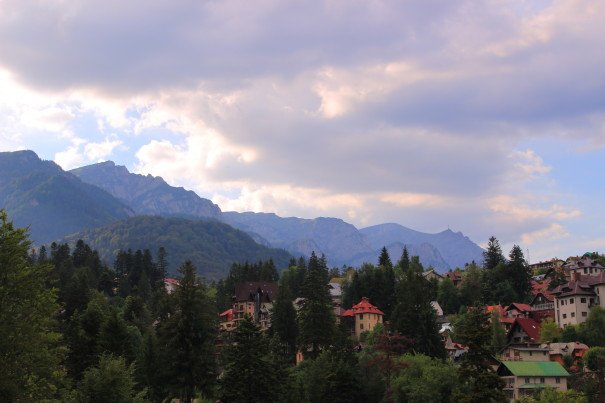
In Vino Historia

In Vino Historia
White Wine in Sinaia
I pass him on the street, a man made frail with age and circumstance, a shock of white hair above a worn face. He is limping up the sidewalk, using a ski pole as a cane. He hails me in Romanian again and again until I turn around to say I can’t understand. “Ah, English!” he says, and switches over immediately. He could just as easily have responded in any other major European language; he spoke eight, I would find out.
So I follow him up the hill in the Sinaia night, and when we get to his home and he invites me up, I have no choice but to accept. His “villa” is hidden in a garden of fruit trees and lavender, cats slinking about, his dogs following at my heels. The house is warm and cluttered. Bookshelves filled with classics in many languages—Proust in French, Goethe in German—are pressed against most of the walls. He introduces me to his wife, Tina, who pours me a glass of white wine and spoons in ice cubes. He then launches into a grand history of his country.
We begin with the artists, Grigoresceu and Tonitza and Andreescu, whom he displays in his living room above a flickering television set, and in an “art gallery” in his bedroom. He grabs another ski pole. In his university days he was a skiing champion, and pictures of him, his father, other men on snowy slopes line the staircase. “I used to ski up there,” he says, and gestures through the walls up to the Bucegi slopes.
He was an engineer in those days, and also a painter. “You cannot understand life under communism,” he tells me: the constant food shortages, the lack of mobility, opportunity, the sense of seclusion from the world outside. He shows me his portrait of Nicolae Ceaușesceu, Romanian megalomaniac and dictator until 1989; it hangs over his toilet. He was lucky, having learned so many languages, and he spent some time in Greece selling icons, and as much time as possible abroad. But there remained a separation.
He refills my glass and insists I eat some cheese with a mound of white pepper piled on top. We have arrived at 1989, the December revolution that ended with Ceaușesceu and his wife summarily executed on Christmas Day. “I held a machine gun,” he says to me, and begins to cry uncontrollably. “I don’t want to go back to that again.” Still crying, he tells me how the radio stations, until then state-controlled, played out George Michael’s “Freedom” upon the dictator’s death. “We were so happy then,” he says.
We are now standing, past midnight, in the near-dark of his garden. “Let me tell you one thing,” he says to me, again and again, expounding on the “genius” Carl Sagan, his love of Mozart, and his hatred of Lenin, Stalin, and the Pope—“A priest!” he says, spitting down the steps. Twice, three times I say goodbye, and still he holds me there. Now he is unemployed, working sometimes as a tour guide, sometimes as a landlord. Within the last ten years his body was wrecked in a car crash and the color left his hair. But here, in this darkness, his eyes seem to glow, and whether from the wine or the length of the day, I stand close, hypnotized.